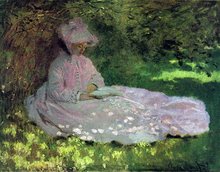Reading The Red Tent gave me a lot to think about and I am glad I had the opportunity. I gained a deeper understanding of the society of women during Old Testament times. I found the sisterhood powerful as Leah, Rachel, Zilpha and Bilhah and ultimately Dinah grew to appreciate each other and value their own uniqueness. I found the portrayal of the interaction of Jacob's wives interesting and plausible. I felt the universality of the issues women deal with: finding a sense of identity and value in the world, figuring out how to make meaningful contributions, the importance of relationships including the role of women in relationship to men, the role of "mothers" whether by birth or not, the process of birth, life and death all resonated with me. Once I started reading, I could hardly put it down. Anita Diamant has written a powerful novel that looks at significant issues.
I found myself re-reading the Bible account in Genesis 34. (Interesting timing since this was one of the recent Gospel Doctrine lessons.) I found it interesting that Dinah "went out to see the daughters of the land." In the Biblical sense, it sounds like she was associating with "worldly" people and the fact that this statement is included makes me think it was risky behavior, or at least, frowned upon. But it also says that Shechem's "soul clave unto Dinah," that he "spake kindly" to her, and that he "was more honourable than all the house of his father." In that sense, he appears to be a tragic figure rather than someone who raped Dinah. (The scripture says that he "took her, and lay with her, and defilied her.") It also appears from the footnotes regarding Simeon and Levi's actions that God was not pleased. (Genesis 49 has the blessings of Jacob to his sons and the footnotes on Simeon and Levi refer to Topical Guide on "cruelty, retribution, and anger." That doesn't seem to say that what they did was right in God's eyes.) But the limited information on the women in the Old Testament and the absence of any reaction of Dinah gave Diamant the license to "fill in the blanks."
However, I was frustrated that in her attempt to tell the story "from the women's point of view," she devalues all of the men involved, including the god, El. Instead of creating faithful women who sustained no-doubt-imperfect men in a patriarchal society, she creates idol-worshipping women and men/patriarchs who are "schmucks," with the exception of those out of the covenant: Dinah's husbands--Shechem and Benia. I found the portrayal of Joseph having sex with Potiphar as well as Potiphar's wife and then looking lustfully at his men servants a little hard to take. I also had a hard time with Isaac and Jacob being dottering fools. Laban's portrayal, while being more consistent with his character in the Old Testament was even a little extreme. I know Diamant is reacting to the tendency to make Biblical characters out to be "bigger than life" heroes, but I didn't think she needed to make them such a mess in order to make them "real."
As far as the idol worship that she attributes to Rachel and Leah and their handmaidens, I wondered. I know that throughout the Bible there is an ongoing effort to keep the covenant people away from idol worship. That means there was a lot of it around. It seems probable that the handmaidens had their own beliefs, but I thought that the reason that such great effort was made to choose wives for Isaac and Jacob was to make sure they were part of the covenant people. It's interesting that Diamant is Jewish because she certainly doesn't value their role as a people with a unique relationship to God.
One additional point, the ritual Dinah goes through as she becomes a woman sounds like female circumcision. While I haven't studied this thoroughly, what I have read is that it is very injurious to women and is still practiced today in some societies. I was surprised that Diamant made it look so wonderful and so much a part of becoming one with all womankind and with Mother Earth.
All in all, I thought The Red Tent was a thoughtful look at a story in the Old Testament that raises more questions than it answers. Thanks, Carolyn for choosing a book that gave us the opportunity to look at things from a different perspective!
--Karen
Thursday, March 30
Subscribe to:
Post Comments (Atom)

2 comments:
P.S. Regarding my review, I forgot to mention that the great efforts Jacob and his family put on being "separate" may have been justified. Shechem's father, Hamor, says, "Shall not their cattle and their substance and every beast of their be ours? only let us consent unto them, and they will dwell with us." Genesis 34:23 It sounds like Dinah's marriage was the first step to being assimilated. Not a great way to be a covenant people.
It seems many of us re-read the Bible account to "check on the facts." I will admit that I never knew this story from the Bible. I was only disappointed with the fact that Diamant felt the need to demean the men in order to elevate womanhood. Nice, thought-provoking review.
Love ya,
Katie
Post a Comment